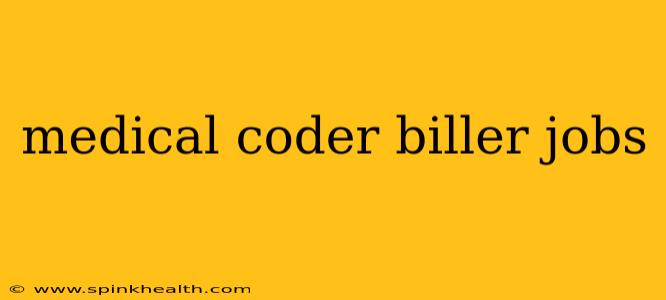Decoding the Thrilling World of Medical Coder Biller Jobs: A Career Path Revealed
The world of healthcare is vast and complex, a intricate tapestry woven with threads of patient care, medical technology, and administrative efficiency. Hidden within this tapestry are the unsung heroes who ensure the smooth functioning of the entire system: medical coders and billers. Their roles are crucial, transforming medical encounters into understandable billing codes and ensuring healthcare providers receive the financial compensation they deserve. This isn't just about numbers; it's about the vital link between patient care and financial sustainability. Let's unravel the mysteries of medical coder biller jobs and explore what makes this career path so compelling.
What Does a Medical Coder Do?
Imagine yourself as a translator, but instead of languages, you're deciphering medical terminology into a universal language understood by insurance companies. That's the essence of a medical coder's job. They take detailed medical records – doctor's notes, lab results, diagnostic images – and convert the clinical information into standardized alphanumeric codes based on the current procedural terminology (CPT) and International Classification of Diseases (ICD) coding systems. Accuracy is paramount; a single misplaced digit could delay or even prevent payment. It requires meticulous attention to detail, a strong understanding of anatomy and physiology, and a knack for deciphering complex medical jargon. Think of them as the key to unlocking healthcare's financial puzzle.
What Does a Medical Biller Do?
While the coder translates the medical language, the biller takes the stage to ensure payment. They take the codes generated by the coder and create and submit claims to insurance companies, following up on denials, resolving discrepancies, and working tirelessly to ensure timely reimbursement. This job requires sharp analytical skills, strong communication, and a good grasp of insurance regulations. It's a demanding role that involves negotiation, persistence, and a dedication to maximizing reimbursements for healthcare providers. The biller is the financial advocate, navigating the intricate world of insurance claims to secure the deserved compensation for services rendered.
What are the Job Prospects for Medical Coders and Billers?
The demand for skilled medical coders and billers is consistently high and shows no signs of slowing down. The healthcare industry is booming, with an ever-increasing number of patients and complex medical procedures. This translates into a large volume of medical records needing coding and billing, creating a constant need for professionals with the right skills. The job market is robust, offering numerous opportunities for both entry-level and experienced professionals, across diverse healthcare settings, from hospitals and clinics to physician practices and insurance companies. The Bureau of Labor Statistics projects substantial growth in these fields for the foreseeable future.
How Much Do Medical Coders and Billers Make?
Salary expectations for medical coders and billers vary depending on experience, location, education, and employer. Entry-level positions typically offer a competitive starting salary with significant growth potential as skills and experience develop. Experienced professionals in high-demand areas can command significantly higher salaries, reflecting the essential nature of their work in the smooth operation of the healthcare system. Many factors influence earnings, so researching specific locations and job markets is crucial for a realistic salary expectation.
What Education and Training is Needed to Become a Medical Coder or Biller?
While a four-year college degree isn't always mandatory, specialized training is essential. Many aspiring coders and billers pursue associate degrees or certificates in medical coding and billing. These programs offer focused curricula covering essential coding systems, billing procedures, medical terminology, and insurance regulations. Online programs and boot camps provide flexible learning options, catering to diverse learning styles and schedules. Continuous professional development is crucial, as coding and billing systems are continuously updated, requiring professionals to stay abreast of changes and maintain their certifications.
What Skills Are Essential for Success in These Roles?
Beyond the technical skills, a successful career in medical coding and billing requires a specific blend of soft skills. Attention to detail is paramount; accuracy is the cornerstone of this profession. Strong analytical and problem-solving abilities are vital for navigating complex medical records and insurance claims. Excellent communication and interpersonal skills are essential for interacting with physicians, other healthcare professionals, and insurance representatives. The ability to work independently and manage time effectively is also key, as medical coders and billers often work under pressure to meet deadlines and maintain accuracy.
In conclusion, medical coder biller jobs offer a rewarding career path for individuals with a strong aptitude for detail, analytical skills, and a passion for the healthcare industry. The demand is high, the job security is strong, and the contribution to the efficient functioning of the healthcare system is invaluable. It's a career that’s not just about numbers; it's about enabling the smooth delivery of quality healthcare to those who need it most.

